|
|
|
Sort Order |
|
|
|
Items / Page
|
|
|
|
|
|
|
| Srl | Item |
| 1 |
ID:
122522
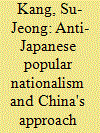

|
|
|
|
|
| Publication |
2013.
|
| Summary/Abstract |
This paper explores the relationship between anti-Japanese popular nationalism and China's approach towards Japan amid Sino-Japanese political tension from 2001 to mid-2006. Among various factors that may affect the relationship, this research focuses on the interaction between the government and the public expressions of anti-Japanese nationalism in China. Throughout most of this period, Sino-Japanese political relations were seriously strained by historical, territorial and other controversial issues, which stirred up anti-Japanese sentiment in China. However, it was only between 2003 and the spring of 2005 that mass anti-Japanese protests were allowed, or at least tolerated, by the Chinese authorities and played a role in Beijing's handling of Japan-related controversies. The paper examines China's domestic political situation during the leadership transition from the third to fourth generation of leaders, which it claims drove the Chinese government's lenient response to popular anti-Japanese protests and enhanced the prospects for popular nationalism to affect the government's approach towards Japan.
|
|
|
|
|
|
|
|
|
|
|
|
|
|
|
|
| 2 |
ID:
177740
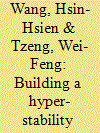

|
|
|
|
|
| Summary/Abstract |
Having been a stable authoritarian regime for more than seven decades, China is an excellent example of how authoritarian regimes can resist pressure from a rapidly transforming society. Its capacity to adapt to social change and maintain a strong hold on power has been observed by students of Chinese politics in the nature of its institutions. These include fragmented governments, decentralization, flexible governance, adaptive capacity, consultative functions, bargained mechanisms, and responsiveness. Xi Jinping’s rise to power and the introduction of information and communications technology (ICT) in recent years have brought about the evolution of the Chinese Communist Party’s methods for governing society. Changes in its governing strategy have merited a review of our understanding of the Chinese regime and inspired an investigation into how social stability is maintained in China. In this paper, we review previous descriptions of China’s authoritarianism and observe the policies the Xi regime has adopted to strengthen state power. We propose that for the purposes of social control, the Xi administration has been building a hierarchical state machine and expanding this machine to the digital sector of society, a campaign which we call “institutional autocratization.” These efforts to establish a hyper-stability structure with new technologies may indeed have strengthened Xi’s rule.
|
|
|
|
|
|
|
|
|
|
|
|
|
|
|
|
| 3 |
ID:
131564


|
|
|
|
|
| Publication |
2014.
|
| Summary/Abstract |
This article reads Bashar al-Asad's rule through the prism of social activism and, in particular, through the field of charities. The sociopolitical transformations Syria experienced between 2000 and 2010-the shift in state-society relations, the opening of the civic arena, and economic liberalization-are explored through the activities of charitable associations, including their interactions with other Syrian actors, and we argue that they reflect the unraveling of the old social contract. The Syrian leadership outsourced important state welfare functions to charities while also creating nongovernmental organizations (NGOs) under its own control and supporting developmental NGOs loyal to the regime. These NGOs differed from the existing charities in terms of their social base, financial backgrounds, motivations, modes of institutionalization, and public relations strategies, and enabled the authoritarian regime to pursue a new strategy of divide-and-rule politics. At the same time, subcontracting poor-relief measures to charities eroded the regime's political legitimacy and helped sow the seeds of the 2011 uprising.
|
|
|
|
|
|
|
|
|
|
|
|
|
|
|
|
| 4 |
ID:
118674
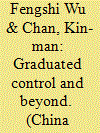

|
|
|
|
|
| Publication |
2012.
|
| Summary/Abstract |
Despite recent policy changes, governmental monitoring and control of grassroots NGOs remain pervasive and effective to a large extent in China. The enforcement of control over NGOs is complicated by at least three layers of factors: First, multiple agencies are involved in NGO control without a centralised norm. Second, government-NGO interactions vary across cases and are deeply rooted in local political contexts. Last, but not least, since the NGO community at its origin is highly diverse, NGOs' responses to various types of governmental control differ, which in turn triggers further complications. The main findings of this research are based on interviews with 60 NGO staff, as well as with civil affairs officials in Shanghai and Shenzhen from January 2011 to May 2012.
|
|
|
|
|
|
|
|
|
|
|
|
|
|
|
|
| 5 |
ID:
131951
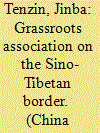

|
|
|
|
|
| Publication |
2014.
|
| Summary/Abstract |
This article investigates the role of the Moluo Tourism Association in Suopo township, Danba county, Sichuan. It examines its organization, internal structure and objectives, and explores the concerns of Tibetan elites and villagers and their strategies for advancing their political and other goals in an officially sanctioned framework. The research shows that the association resembles a "state-led civil society" as its membership and agendas exhibit the strong will of the local state; nevertheless, it still manages to carve a space for expressing negative opinions towards the local authorities, pursuing the "Eastern Queendom" cause and following its own agendas. The dynamic and nuanced interactions between the association and township show that state-society relations in China are situated in a complex and convoluted landscape which has not yet been fully explored in the China field. Furthermore, the article brings to light the divergent interests and positions of the association members as well as the heterogeneity of Suopo society proper. It concludes with a brief discussion of the prospects for an enhanced engagement of ethnic research with broader China studies.
|
|
|
|
|
|
|
|
|
|
|
|
|
|
|
|
| 6 |
ID:
110231
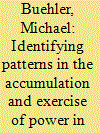

|
|
|
|
|
| Publication |
2012.
|
| Summary/Abstract |
The implosion of the New Order in 1998 led to a more democratic political system in Indonesia with elections at all levels of government. A year later, Indonesia also embarked on an ambitious decentralization program that initiated a fundamental restructuring of the country's political institutions on a scale unprecedented since the 1960s. Yet, scholars are still trying to identify clear patterns in the accumulation and exercise of power in this new political environment.
|
|
|
|
|
|
|
|
|
|
|
|
|
|
|
|
| 7 |
ID:
126644
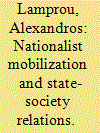

|
|
|
|
|
| Publication |
2013.
|
| Summary/Abstract |
This article studies the campaign against the use of non-Turkish languages that was organized by local forces in Izmir in 1934. In contextualizing the campaign within domestic politics and state-society relation, the article attempts to study domestic politics through a local perspective and explore the impact that similar events in the periphery had in the centre's policies, which the literature is usually inclined to comprehend solely with reference to state 'high politics'. The article argues that cases of autonomous mobilization from below, such as the 1934 Izmir campaign, contributed to the evolution of the Turkish political regime in the 1930s by turning the centre towards decisions that would redesign the relationship between the state and the ruling party, and have an impact on state-society relations.
|
|
|
|
|
|
|
|
|
|
|
|
|
|
|
|
| 8 |
ID:
120338
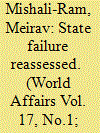

|
|
|
| 9 |
ID:
192980
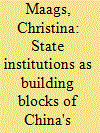

|
|
|
|
|
| Summary/Abstract |
The past is continuously reinterpreted to serve the interests of the present. Over the last two centuries of turbulent Chinese history, the past has been redefined through narratives and categorisations. How does the party-state manage the diversity and complexity of China's past, and what implications does this have for state–society relations in China? Based on a case study of China's adoption of the Intangible Cultural Heritage Convention, this article argues that the Chinese party-state creates “infrastructures of memory,” which enable it to actively manage China's diverse past through selective institutionalisation. This process creates a “cognitive map” of tangible and rationalised relations and boundaries between vernacular memories as interpreted by the state. Although this map is to shape and direct Chinese collective memory and identity, it also sparks contestation among members of the populace who seek to preserve vernacular and multiple memories of their socio-cultural past.
|
|
|
|
|
|
|
|
|
|
|
|
|
|
|
|
| 10 |
ID:
124051
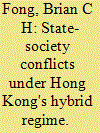

|
|
|
|
|
| Publication |
2013.
|
| Summary/Abstract |
Similar to its colonial predecessor, the post-colonial Hong Kong state relies on its business allies to mediate state-society relations. Nevertheless, because of the erosion of the intermediary role of business elites, the state-business alliance now struggles to accommodate the rising challenges of civil society. The case of Hong Kong offers an interesting case study to the literature on hybrid regimes.
|
|
|
|
|
|
|
|
|
|
|
|
|
|
|
|
| 11 |
ID:
172174
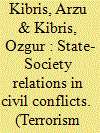

|
|
|
|
|
| Summary/Abstract |
Civil conflicts are conceptualized as asymmetric, population-centric military struggles. The argument is that insurgencies, even though they are no match in military power to their state adversaries in many cases, resort to armed struggle nonetheless as a tool to impair state capacity, the quality of governance, and the ability of the state to honor the “social contract” in order to eventually destroy state authority and render the state irrelevant for the society. Note that this argument implies that state-society relations do react to the military course of the conflict. In this article, we provide empirical evidence for this implication. Introducing a new panel dataset on the long-running civil conflict in Turkey, we first conduct a micro-level analysis and demonstrate the significant impact rebel presence has upon state-society relations across localities and time. We then analyze the results of semi-structured interviews we had conducted with a group of experts from the conflict regions to decipher the possible mechanisms behind the association we observe in the data. The interviews support our motivating theoretical argument.
|
|
|
|
|
|
|
|
|
|
|
|
|
|
|
|
| 12 |
ID:
122937
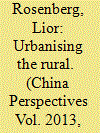

|
|
|
|
|
| Publication |
2013.
|
| Summary/Abstract |
The transition from traditional rural residences to urban-like multi-storey buildings and from traditional villages to rural residential communities (shequ) is one of rural China's most profound developments of the early twenty-first century. Official discourse highlights the potential benefits for villagers, portraying the new residential communities as gateways to modernity and significant steps toward reducing inequality and disparity between the rural and the urban. Based on extensive research in two counties in Shandong and Anhui provinces, this article concludes that while imposing urban-like models of residence may coincide with prosperous communities' circumstances, it may easily become a statist venture of predation and a source of tension and rural discontent in less prosperous communities.
|
|
|
|
|
|
|
|
|
|
|
|
|
|
|
|
|
|
|
|
|